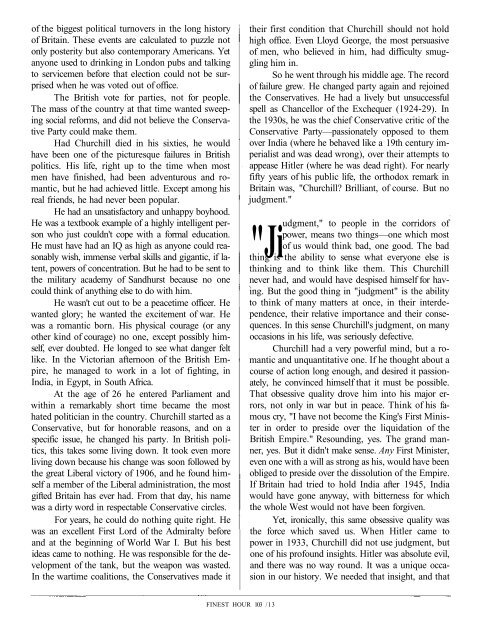.JOURNAL OFTIIE CHURCHILL CKNTER AND ... - Winston Churchill
.JOURNAL OFTIIE CHURCHILL CKNTER AND ... - Winston Churchill
.JOURNAL OFTIIE CHURCHILL CKNTER AND ... - Winston Churchill
- No tags were found...
You also want an ePaper? Increase the reach of your titles
YUMPU automatically turns print PDFs into web optimized ePapers that Google loves.
of the biggest political turnovers in the long historyof Britain. These events are calculated to puzzle notonly posterity but also contemporary Americans. Yetanyone used to drinking in London pubs and talkingto servicemen before that election could not be surprisedwhen he was voted out of office.The British vote for parties, not for people.The mass of the country at that time wanted sweepingsocial reforms, and did not believe the ConservativeParty could make them.Had <strong>Churchill</strong> died in his sixties, he wouldhave been one of the picturesque failures in Britishpolitics. His life, right up to the time when mostmen have finished, had been adventurous and romantic,but he had achieved little. Except among hisreal friends, he had never been popular.He had an unsatisfactory and unhappy boyhood.He was a textbook example of a highly intelligent personwho just couldn't cope with a formal education.He must have had an IQ as high as anyone could reasonablywish, immense verbal skills and gigantic, if latent,powers of concentration. But he had to be sent tothe military academy of Sandhurst because no onecould think of anything else to do with him.He wasn't cut out to be a peacetime officer. Hewanted glory; he wanted the excitement of war. Hewas a romantic born. His physical courage (or anyother kind of courage) no one, except possibly himself,ever doubted. He longed to see what danger feltlike. In the Victorian afternoon of the British Empire,he managed to work in a lot of fighting, inIndia, in Egypt, in South Africa.At the age of 26 he entered Parliament andwithin a remarkably short time became the mosthated politician in the country. <strong>Churchill</strong> started as aConservative, but for honorable reasons, and on aspecific issue, he changed his party. In British politics,this takes some living down. It took even moreliving down because his change was soon followed bythe great Liberal victory of 1906, and he found himselfa member of the Liberal administration, the mostgifted Britain has ever had. From that day, his namewas a dirty word in respectable Conservative circles.For years, he could do nothing quite right. Hewas an excellent First Lord of the Admiralty beforeand at the beginning of World War I. But his bestideas came to nothing. He was responsible for the developmentof the tank, but the weapon was wasted.In the wartime coalitions, the Conservatives made ittheir first condition that <strong>Churchill</strong> should not holdhigh office. Even Lloyd George, the most persuasiveof men, who believed in him, had difficulty smugglinghim in.So he went through his middle age. The recordof failure grew. He changed party again and rejoinedthe Conservatives. He had a lively but unsuccessfulspell as Chancellor of the Exchequer (1924-29). Inthe 1930s, he was the chief Conservative critic of theConservative Party—passionately opposed to themover India (where he behaved like a 19th century imperialistand was dead wrong), over their attempts toappease Hitler (where he was dead right). For nearlyfifty years of his public life, the orthodox remark inBritain was, "<strong>Churchill</strong>? Brilliant, of course. But nojudgment."to people in the corridors ofpower, means two things—one which mostof us would think bad, one good. The badthing "Jiudgment,"is the ability to sense what everyone else isthinking and to think like them. This <strong>Churchill</strong>never had, and would have despised himself for having.But the good thing in "judgment" is the abilityto think of many matters at once, in their interdependence,their relative importance and their consequences.In this sense <strong>Churchill</strong>'s judgment, on manyoccasions in his life, was seriously defective.<strong>Churchill</strong> had a very powerful mind, but a romanticand unquantitative one. If he thought about acourse of action long enough, and desired it passionately,he convinced himself that it must be possible.That obsessive quality drove him into his major errors,not only in war but in peace. Think of his famouscry, "I have not become the King's First Ministerin order to preside over the liquidation of theBritish Empire." Resounding, yes. The grand manner,yes. But it didn't make sense. Any First Minister,even one with a will as strong as his, would have beenobliged to preside over the dissolution of the Empire.If Britain had tried to hold India after 1945, Indiawould have gone anyway, with bitterness for whichthe whole West would not have been forgiven.Yet, ironically, this same obsessive quality wasthe force which saved us. When Hitler came topower in 1933, <strong>Churchill</strong> did not use judgment, butone of his profound insights. Hitler was absolute evil,and there was no way round. It was a unique occasionin our history. We needed that insight, and thatFINEST HOUR 103 /13

















